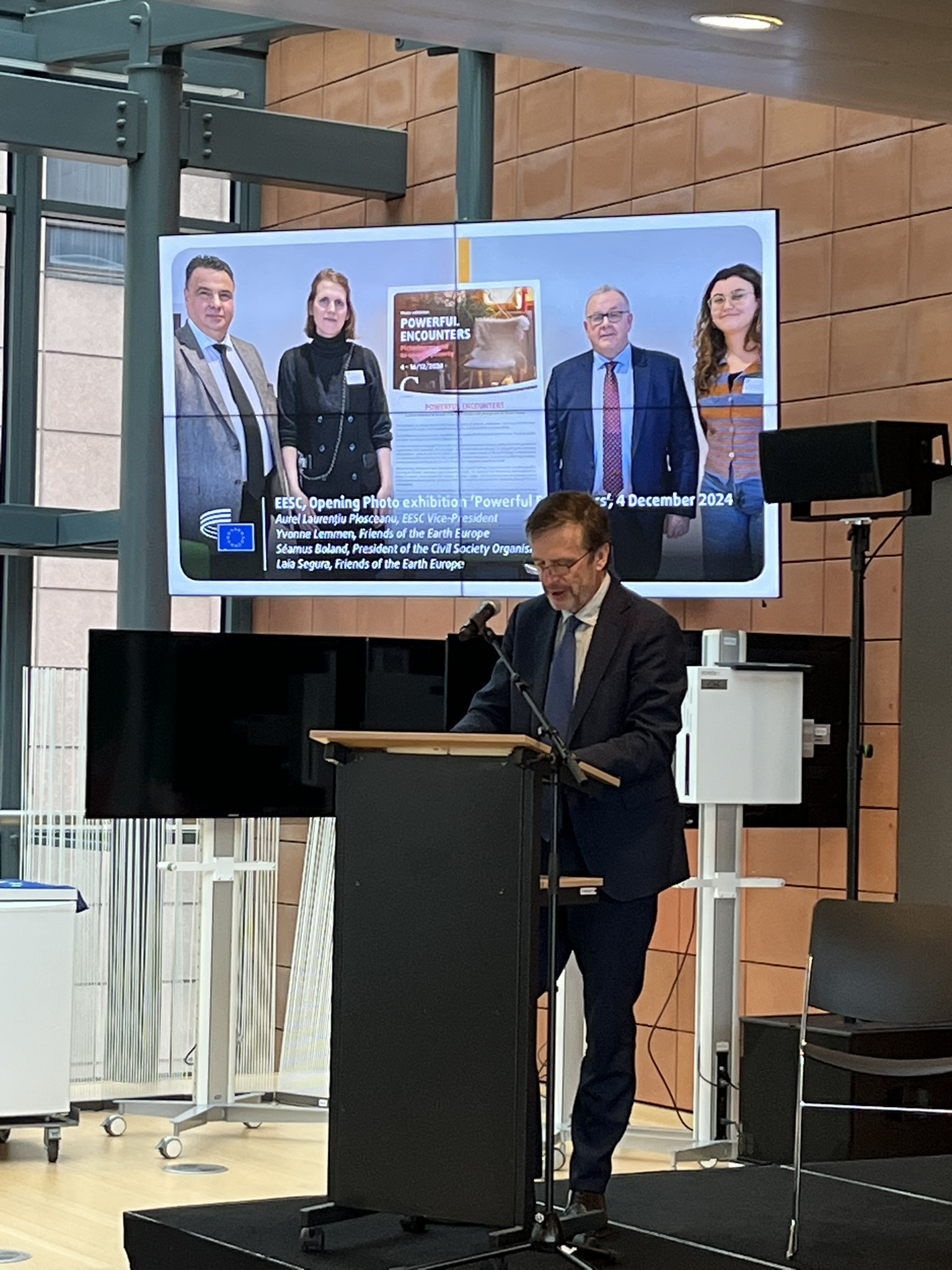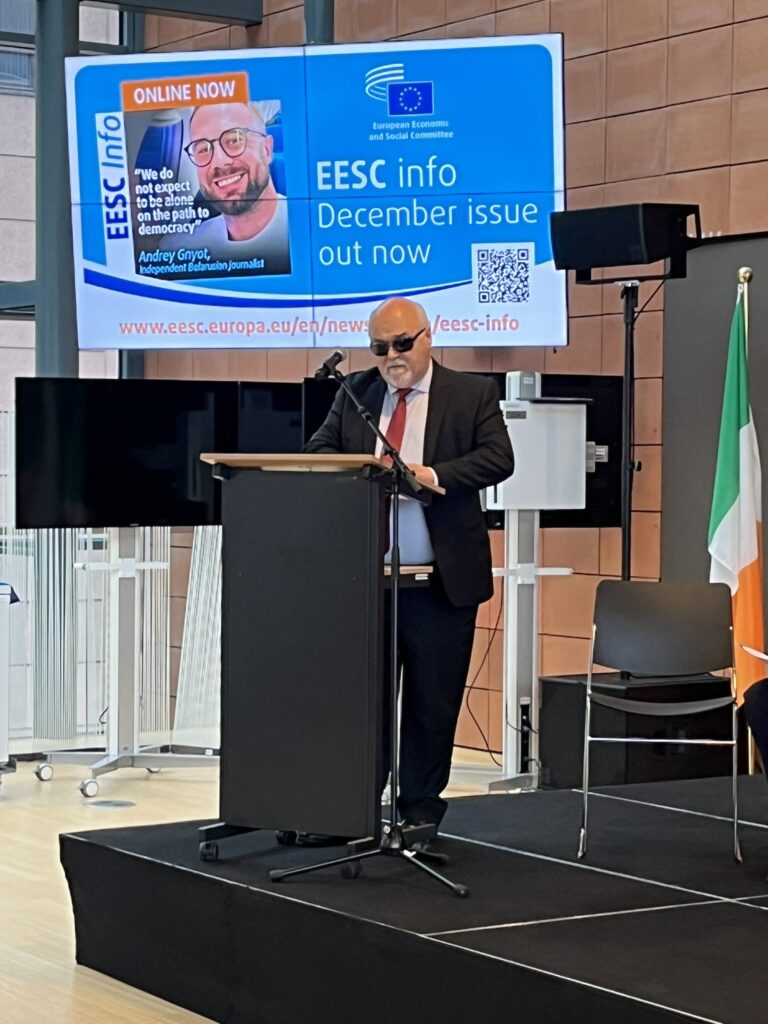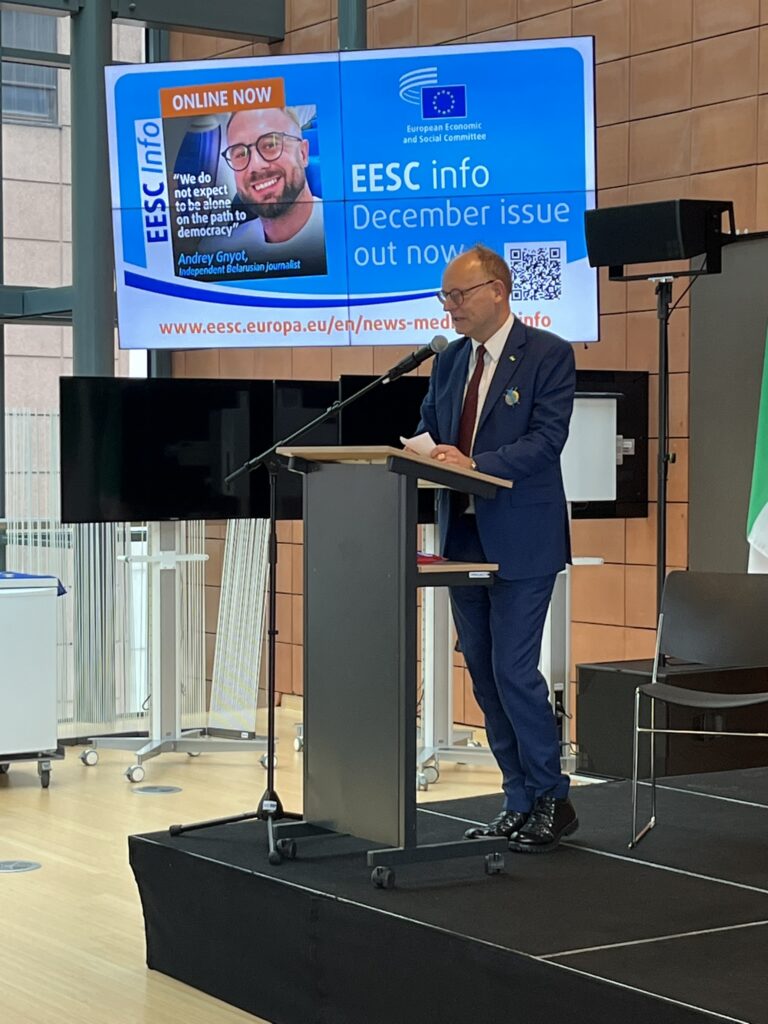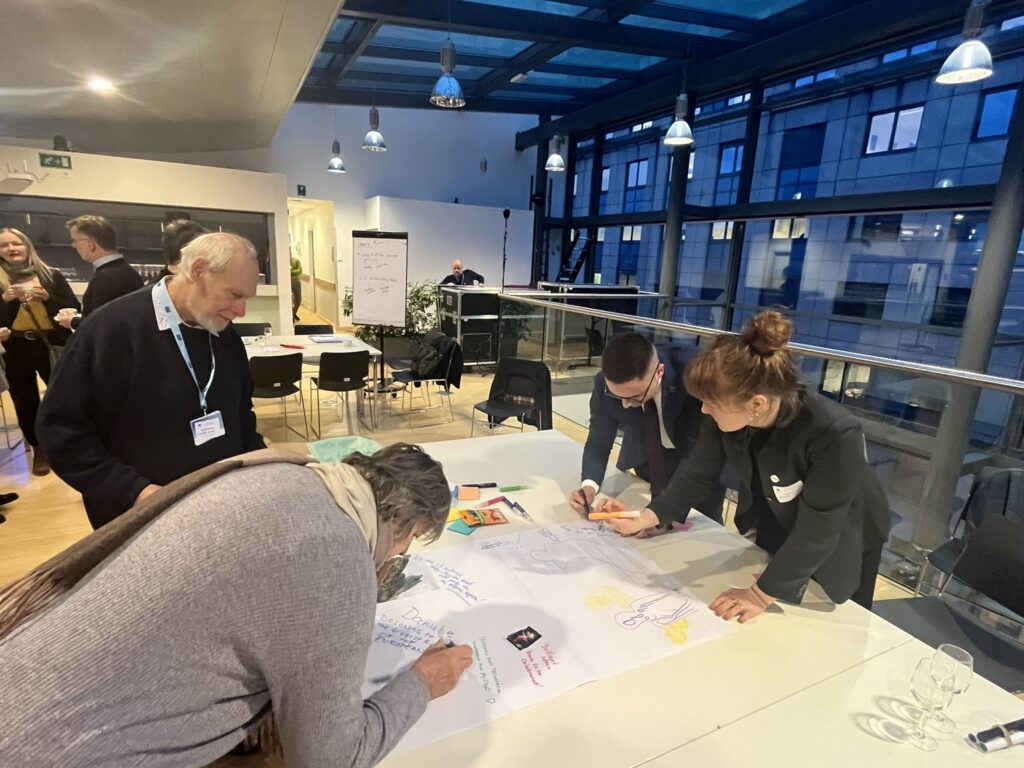The Second Macro-Regional Citizen Agora was held on 17 December 2024 in Brussels in partnership with the European Economic and Social Committee. The Agora was the concluding event of the yearlong programme Stronger.Together – The magic macro-regions 2024 coordinated by European House Budapest.
Participants came from all the four macro-regions, the Baltic Sea, the Danube, the Adriatic-Ionian and the Alpine and even beyond.
In his introductory statement Director Slawomir Tokarski (European Commission DG Regio) underlined the growing importance of civil society involvement in shaping and implementing the macro-regional idea. The upcoming period will offer plenty of opportunities to translate this idea into concrete actions.



Speaking on behalf of the European Economic and Social Comittee, Ioannis Vardakastanis, ECO Section President confirmed the EESC’s commitment to the macro-regional strategies, a promising field of cooperation among different civil society actors. This is convincingly expressed by the partnership in hosting the Second Macro-Regional Citizen Agora.
The opening panel discussion brought together high-level speakers from the four macro-regions: Anna Hagström, Prime Minister’s Office, Sweden (EUSBSR), Dr Harald Stranzl, Ambassador, EUSDR Austrian Presidency (EUSDR), Mathilde Konstatopoulou, EUSAIR Hellenic Presidency (EUSAIR), Hortense Lutz-Hermelin, Head, Auvergne Rhône-Alpes Region Delegation, Brussels (EUSALP) and Maryna Yaroshevych, Ukrainian Prism Europe, Ukraine.

Ms Hagström spoke about the Baltic Sea region as a reference point of collaboration using as an example the recently held EUSBSR Annual Forum in Visby, Sweden preceded by an Engagement Day with broad participation of „non-usual” suspects. She was optimist about the future of macro-regional strategies.
In the Danube region, the Austrian Presidency is just coming to an end with a very ambitious and rich programme aiming at making Europe a safe and resilient place. The highlight of the Presidency was the Annual Forum held in Vienna in June. Much attention was given to the process of EU enlargement, with a particular emphasis on Ukraine, said Ambassador Stranzl.
Ms Konstatopoulou presented the priorities of the Hellenic EUSAIR Presidency, including the post-2027 cohesion policy, the blue economy and climate change. The issue of EU enlargement is of particular importance to them, as in this macro-region the number applicant countries (5) exceeds the number of EU Member States (4).
Ms Lutz-Hermelin highlighted the importance of youth involvement in macro-regional strategies. In this respect the setting up of the EUSALP Youth Council has set a positive example from which other macro-regional strategies greatly benefited.
In a very emotional contribution Ms Yaroshevych urged us to not give up supporting Ukraine arguing that the case of Ukraine is a case for Europe.

Participants also received some insight to the preparations and state-of-play of the new Implementation Report on EU macro-regional strategies of the Commission from Johan Magnusson who indicated that there are still possibilities for CSOs to enrich the content of this important document.
The second panel composed by representatives coming from the four preparatory meetings in the macro-regions leading to the Agora: Yoan Pompet, Maison des Européens Lyon, France for the EUSALP, Pejo Bosnic, EASTok, Croatia for the EUSAIR, Christiana Pordes, The World of NGOs, Austria for the EUSDR and Silva Laure, Baltic Sea Youth Forum, Vice-Chair of the Commitee of Youth Representatives, Latvia for the EUSBSR. They shared their experiences on how macro-regional strategies are perceived by citizens, from a bottom-up perspective. This served as an introduction to the afternoon sessions.

In the concluding part of the morning plenary session Seamus Boland, President, EESC Group III (Civil Society Organisations) & Designated Candidate for the EESC Presidency 2025-2028 greeted the participants and underlined the importance of maintaining and developing regular contacts with different segments of civil society in Europe. This will be a priority of his programme as EESC President.
During the second half of Agora participants delved into vivid discussions in four working groups addressing the following issues:
- the future of macro-regional strategies
- everyday perspectives of Cohesion policy
- challenges of meaningful macro-regional youth participation
- a new initiative: the European Cross-Border Association



A characteristic feature of the discussions was the emergence of a significant number of concrete proposals creating the basis for a 2025 workplan. It brings together and combines the efforts of members of the Macro-Regional CSO Network and other interested stakeholders for meaningful joint activities in the following fields:
A) Proposals on policy level:
1. contribute actively and creatively to the repositioning and invigorating the EU macro-regional strategies as usefful tools for the promotion of the European agenda under the new circumstances
2. initiate the establishment of a formalised mechanism of citizen’s dialogue across macro-regions as indicated in the 4th Implementation report of the Commission
3. translate the partnership principle into practice by securing a regulated and coordinated CSO presence in the MRS governance structures and its working bodies
4. use the ‘in-between’ approach as an effective means to reduce the distance between the EU institutions and citizens; maintain and develop proactive and systematic dialogue with the European Commission (DG Regio), the European Parliament (REGI Committee), the rotating Presidency of the European Council, the European Economic and Social Committee and the Committee of the Regions
5. disseminate broadly pro-European messages among citizens on current issues using traditional and new communication tools
6. make the Macro-Regional CSO Network, an open and inclusive collaborative platform of registered civil society organisations the recognised and legitimate voice of CSOs on macro-regional matters.
B) Proposals on operational level:
1. organise a mission in each macro-regions: in Crete (May) for the EUSAIR, in Torino ( June) for the EUSALP, in Vienna and Bratislava (June-July) for the EUSDR and in Gdansk (October) for the EUSBSR; the process concludes in Budapest in December with the holding of the Third Macro-Regional Citizen Agora
2. attend the EU Macro-Regional and Sea Basin Strategic Days to be held in Brussels in September and within its framework organise a civil society workshop
3. pay special attention to youth issues and organise a capacity building and training summer academy for young people from the four macro-regions in Krems, AT in July
4. contribute to the preparations and holding of the macro-regional Annual Forums by highlighting the value added nature of civil society involvement in their programmes in Crete for the EUSAIR in May, in Gdansk for the EUSBSR in October, in Sarajevo for the EUSDR in November and in Innsbruck for the EUSALP in November
5. submit special inputs to the elaboration of major macro-regional policy documents including the 5th Implementation Report of the Commission, the public consultation on the post-27 Cohesion policy and on the future of the Interreg programme and others
6. promote the idea of the European Cross-Border Association (ECBA) by virtue of a directive; the ECBA is an appropriate tool to identify and propose practical cross-border solutions in a macro-regional context
7. disseminate systematically pro-European messages to citizens through and by the ‘Connect’ monthly newsletter, the Macro-Regional Civil Yearbook, the online information sessions on topical issues and by other social media tools.
These proposals were presented to the closing plenary session of the Agora and it was agreed that they constituted the backbone of the 2025 programme. It is the task of the MRS Annual Meeting of network members to be held in Brussels on 18 December 2024 to finalise and adopt the programme for the year 2025.
During the concluding phase of the Agora participants prepared a Mood Poster carrying informal and supportive messages.

In his closing words the director of European House thanked the participants of the Agora making it a success and the hospitality and support of the European Economic and Social Committee.

Funded by the European Union. Views and opinions expressed are however those of the author(s) only and do not necessarily reflect those of the European Union or EACEA. Neither the European Union nor the granting authority can be held responsible for them.
